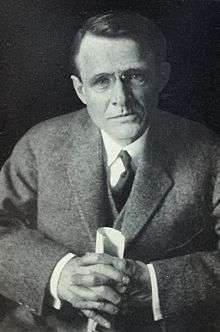Frederic C. Howe
| Frederic C. Howe | |
|---|---|
 | |
| Member of the Cleveland City Council | |
|
In office 1901 – ? | |
| Personal details | |
| Born |
Frederic Clemson Howe November 21, 1867 |
| Died | August 3, 1940 (aged 72) |
| Political party | Republican |
| Spouse(s) | Marie Jenney Howe |
| Alma mater |
Miami University Johns Hopkins University Allegheny College |
Frederic Clemson Howe (November 21, 1867 – August 3, 1940) was a member of the Ohio Senate, Georgist,[1] Commissioner of Immigration of the Port of New York, and published author. He was also president of the League for Small and Subject Nationalities.[2]
He received a bachelor's degree from Allegheny College in 1889 and a Ph.D from Johns Hopkins University in 1892. In 1901, he was elected to Cleveland City Council, Ohio as a Republican. During his tenure, he became a key advisor to Tom L. Johnson, mayor of Cleveland at that time. He ran for reelection as an independent, but lost. In 1904, he married Marie Jenney. He studied law at Miami University in Ohio.
On 27 July 1933, George N. Peek, head of the Agricultural Adjustment Administration appointed Howe as the head of the Consumers' Counsel.[3] Howe associated with other left-wing members of the Roosevelt administration.
Rexford Tugwell claimed that Howe was "the subject of vitriolic attacks by the business interests" and was "pictured as a Red".[4] Chester R. Davis now decided to get rid of Howe. He later recalled: "Fred Howe was a man of high ideals and very practical sense. He was the 'turn the other cheek' type. He was a well-meaning man who permitted his organization to be loaded down with a group of people who were more concerned with stirring up discontent than they were with achieving the objectives of the act." [5]
Frederic Clemson Howe is buried in Meadville, Pennsylvania.
Notes
- ↑ Howe, Frederic C. The Confessions of a Reformer. Kent, OH: Kent State UP, 1988.
- ↑ http://ech.cwru.edu/ech-cgi/article.pl?id=HFC
- ↑ http://spartacus-educational.com/Frederic_C_Howe.htm
- ↑ Rexford Tugwell, Roosevelt's Revolution (1977) page 355
- ↑ Chester R. Davis, Reminiscences (1953) page 313
Bibliography
- (1896). Taxation and Taxes in the United States.
- (1897). The City of Cleveland in Relation to the Street Railway Question.
- (1905). The City: the Hope of Democracy.
- (1906). The Confessions of a Monopolist.
- (1907). The British City: The Beginnings of Democracy.
- (1910). Privilege and Democracy in America.
- (1912). Wisconsin: An Experiment in Democracy.
- (1913). European Cities at Work.
- (1914). The Modern City and Its Problems.
- (1915). Socialized Germany.
- (1916). Why War.
- (1917). The High Cost of Living.
- (1919). The Land and the Soldier.
- (1919). The Only Possible Peace.
- (1921). Denmark: a Cooperative Commonwealth.
- (1921). Revolution and Democracy.
- (1925). The Confessions of a Reformer.
Further reading
- Breamner, Robert H. (1949). "Honest Man's Story: Frederic C. Howe," The American Journal of Economics and Sociology, Vol. 8, No. 4, pp. 413–422.
- Miller, Kenneth E. (2010). From Progressive to New Dealer: Frederic C. Howe and American Liberalism. Penn State University Press.
- Rippley, LaVern J. (1988). "Charles McCarthy and Frederic C. Howe: Their Imperial German Sources for the Wisconsin Idea in Progressive Politics," Monatshefte, Vol. 80, No. 1, pp. 67–81.
External links
- Works by or about Frederic C. Howe at Internet Archive
- Works by Frederic C. Howe, at JSTOR
- Works by Frederic C. Howe, at Hathi Trust
- Works by Frederic C. Howe, at Unz.org
- Howe biography at Encyclopedia of Cleveland History
- "Frederic C. Howe: Making Cleveland the City Beautiful (Or At Least, Trying)"
- "The Sconset School of Opinion"
|